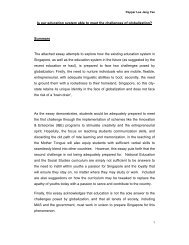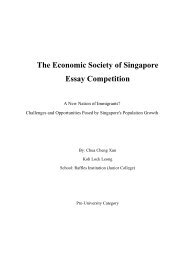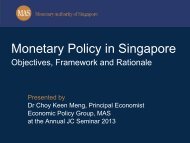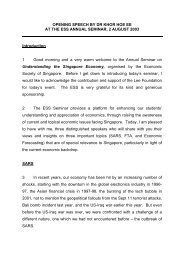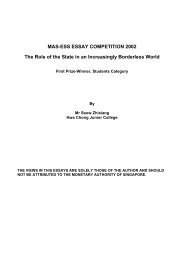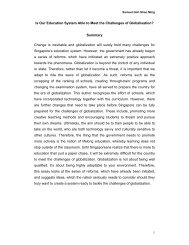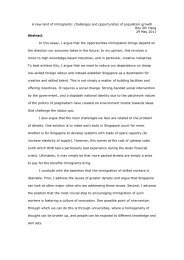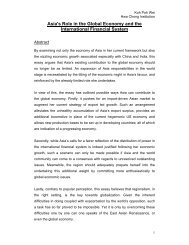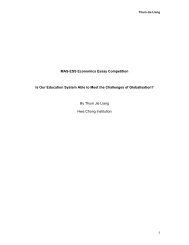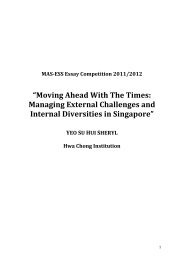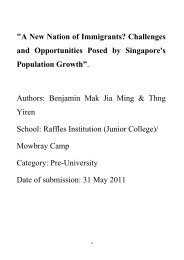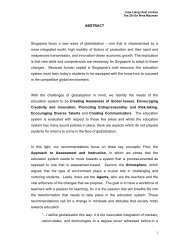the role of the state in an increasingly borderless world - Economic ...
the role of the state in an increasingly borderless world - Economic ...
the role of the state in an increasingly borderless world - Economic ...
- No tags were found...
You also want an ePaper? Increase the reach of your titles
YUMPU automatically turns print PDFs into web optimized ePapers that Google loves.
ECONOMIC REFORMS AROUND THE WORLD<br />
Jap<strong>an</strong><br />
Jap<strong>an</strong> is my first example <strong>of</strong> <strong>an</strong> economy tr<strong>an</strong>sform<strong>in</strong>g itself fundamentally. For two <strong>an</strong>d<br />
a half centuries up to <strong>the</strong> middle <strong>of</strong> <strong>the</strong> 19th century, Jap<strong>an</strong> was ruled by <strong>the</strong> Tokugawa<br />
Shogunate. It was <strong>in</strong>ward-look<strong>in</strong>g <strong>an</strong>d <strong>in</strong>sular. The Tokugawas only allowed coastal vessels<br />
that could not make oce<strong>an</strong> voyages. Foreigners l<strong>an</strong>d<strong>in</strong>g on Jap<strong>an</strong>ese soil, even if by accident,<br />
faced severe punishment. But <strong>in</strong> 1853 Commodore Perry arrived <strong>in</strong> Tokyo Bay with a quarter<br />
<strong>of</strong> <strong>the</strong> US navy – <strong>the</strong> “Black Ships”. This demonstration <strong>of</strong> US military supremacy forced Jap<strong>an</strong><br />
to open itself up to foreign trade <strong>an</strong>d <strong>in</strong>fluence.<br />
Beh<strong>in</strong>d its closed doors, Jap<strong>an</strong> had fallen beh<strong>in</strong>d <strong>the</strong> West. It became clear that <strong>the</strong><br />
Tokugawa regime was not able to lead <strong>the</strong> country <strong>in</strong>to <strong>the</strong> new era. So <strong>in</strong> 1867 a group <strong>of</strong><br />
young samurais led a coup to overthrow <strong>the</strong> Shogunate. They restored <strong>the</strong> Meiji Emperor, <strong>an</strong>d<br />
ruled Jap<strong>an</strong> <strong>in</strong> his name.<br />
The reformers were determ<strong>in</strong>ed to make Jap<strong>an</strong> a strong country aga<strong>in</strong>. They made a<br />
decisive break from feudalism <strong>an</strong>d set about systematically modernis<strong>in</strong>g <strong>the</strong> country. Their<br />
strategy was to learn from <strong>the</strong> West <strong>an</strong>d set Jap<strong>an</strong> on <strong>the</strong> path <strong>of</strong> <strong>in</strong>dustrialisation. They<br />
succeeded brilli<strong>an</strong>tly. With<strong>in</strong> 40 years, <strong>the</strong> Jap<strong>an</strong>ese Navy defeated <strong>the</strong> Russi<strong>an</strong> fleet <strong>in</strong> battle<br />
(1904-1905). Jap<strong>an</strong>’s take-<strong>of</strong>f cont<strong>in</strong>ued right up to <strong>the</strong> onset <strong>of</strong> World War II. <strong>Economic</strong><br />
histori<strong>an</strong>s have estimated that Jap<strong>an</strong> experienced a 14-fold <strong>in</strong>crease <strong>in</strong> <strong>in</strong>come levels over this<br />
period.<br />
Total defeat <strong>in</strong> World War II reduced Jap<strong>an</strong> to ru<strong>in</strong>s. After <strong>the</strong> war, Jap<strong>an</strong> faced <strong>the</strong><br />
massive task <strong>of</strong> reconstruction <strong>an</strong>d development. Jap<strong>an</strong>ese firms cooperated with <strong>the</strong><br />
Americ<strong>an</strong>s, raised <strong>the</strong>ir technical expertise, <strong>an</strong>d benefited from <strong>in</strong>stitutional reforms <strong>of</strong> <strong>the</strong><br />
Occupation period for a new, market-based economy. By 1950, <strong>the</strong> pre-war zaibatsu<br />
conglomerates were dissolved <strong>an</strong>d family control had been elim<strong>in</strong>ated. The zaibatsu system<br />
was replaced by <strong>the</strong> keiretsu system, built around <strong>the</strong> ma<strong>in</strong> b<strong>an</strong>ks, which shared large crosssharehold<strong>in</strong>gs<br />
with <strong>the</strong> corporate sector. Control passed from shareholders to top m<strong>an</strong>agers.<br />
M<strong>an</strong>agers <strong>an</strong>d workers worked toge<strong>the</strong>r as one to rebuild <strong>the</strong> country. The whole system was<br />
underp<strong>in</strong>ned by <strong>the</strong> consistent <strong>an</strong>d coherent political leadership <strong>of</strong> <strong>the</strong> Liberal Democratic Party,<br />
supported by <strong>an</strong> elite civil service. This strategy yielded 30 years <strong>of</strong> unparalleled growth. By<br />
<strong>the</strong> 1980s, Jap<strong>an</strong> had become <strong>an</strong> economic superpower.<br />
But <strong>the</strong> formula did not work forever. In 1990, <strong>the</strong> excesses <strong>of</strong> <strong>the</strong> bubble economy<br />
ended <strong>in</strong> <strong>the</strong> collapse <strong>of</strong> Jap<strong>an</strong>’s property <strong>an</strong>d stock markets. Jap<strong>an</strong> entered a prolonged period<br />
<strong>of</strong> stagnation, whose end is still not yet <strong>in</strong> sight. Policies <strong>an</strong>d <strong>in</strong>stitutions had not kept up with<br />
<strong>the</strong> dem<strong>an</strong>ds <strong>of</strong> globalisation. The keiretsu model <strong>an</strong>d <strong>the</strong> lifelong employment system were too<br />
rigid to adapt to <strong>the</strong> rapid ch<strong>an</strong>ges <strong>of</strong> <strong>the</strong> new economy. And ch<strong>an</strong>g<strong>in</strong>g <strong>the</strong> economic model<br />
would me<strong>an</strong> radically alter<strong>in</strong>g <strong>the</strong> social <strong>an</strong>d political framework as well. This time, <strong>the</strong> national<br />
consensus for reform, <strong>an</strong>d <strong>the</strong> will to ch<strong>an</strong>ge, has proved elusive. But given Jap<strong>an</strong>’s past ability<br />
to remake itself, it would be hasty to conclude that it will not do so aga<strong>in</strong>.<br />
Ch<strong>in</strong>a<br />
Ch<strong>in</strong>a <strong>of</strong>fers <strong>an</strong> <strong>in</strong>terest<strong>in</strong>g contrast to Jap<strong>an</strong>’s experience <strong>of</strong> modernisation. In <strong>the</strong> 18th<br />
century, at <strong>the</strong> zenith <strong>of</strong> <strong>the</strong> Q<strong>in</strong>g Dynasty, Emperor Qi<strong>an</strong> Long promulgated a “closed door<br />
policy” to restrict foreign trade to <strong>the</strong> s<strong>in</strong>gle port <strong>of</strong> C<strong>an</strong>ton, cutt<strong>in</strong>g Ch<strong>in</strong>a <strong>of</strong>f from Western<br />
technology <strong>an</strong>d <strong>in</strong>fluence. In 1793, Brita<strong>in</strong> sent Lord George Macartney on a diplomatic mission<br />
to request for broader trad<strong>in</strong>g opportunities <strong>an</strong>d diplomatic representation <strong>in</strong> Beij<strong>in</strong>g. The<br />
request was refused. The Emperor declared <strong>in</strong> his reply to K<strong>in</strong>g George III that Ch<strong>in</strong>a<br />
“possesses all th<strong>in</strong>gs <strong>in</strong> prolific abund<strong>an</strong>ce <strong>an</strong>d lacks no products with<strong>in</strong> its own borders”. The<br />
6



